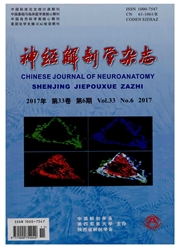

 中文摘要:
中文摘要:
本实验通过观察慢性复合应激对成年大鼠海马NeuroD表达的影响,探讨慢性复合应激与海马神经发生的关系。将成年雄性大鼠32只随机分为慢性复合应激组(简称应激组)和正常对照组(简称对照组)。应激组动物每天不规律交替暴露于四种复合应激原中,共持续6周。然后运用免疫组织化学染色、Western—blot和RT-PCR技术分别观察海马内NeuroD阳性神经元数量、NeuroD蛋白水平和核酸水平的变化。结果显示:慢性复合应激组动物海马齿状回NeuroD阳性神经元数量明显增多(P〈0.05);海马NeuroD蛋白的表达明显增强(P〈0.05);海马NeuroD mRNA水平明显上调(P〈0.05)。表明慢性复合应激可引起海马NeuroD阳性神经元数量增多和NeuroD表达水平升高,提示慢性复合应激可能促进大鼠海马的神经发生。
 英文摘要:
英文摘要:
To explore the relationship of chronic muhiple stresses with hippocampal neurogenesis, we observed the effect of chronic multiple stressors on the expression of NeuroD in the hippocampus of the adult rat. Thirty-two male adult Wistar rats were randomly divided into two groups: the chronic multiple stressed group (stressed group)and the control group. Rats in the stressed group were randomly exposed to one of the four stressors during each day ; the stress procedure lasted for 6 weeks. Then the number of NeuroD-immunopositive neurons in the hippocampus was counted by using immunohistoehemlstry, and hippocampal expression of NeuroD at protein and mRNA levels was assayed by using Western-blot and RT-PCR techniques, respectively. The results showed that: ( 1 ) The number of NeuroD-immunopositire neurons in the hippocampus of the stressed rats was significantly larger than that of the control group ( P 〈 0.05 ) ; ( 2 ) The protein and mRNA levels of NeuroD in the hippocampus of the stressed rats were remarkably higher than those of the control group ( P 〈 0.05 ). The increase of the NeuroD-immunopositive neurons and enhanced expression of NeuroD in the hippocampus may be induced by the chronic multiple stressors, which suggests that chronic multiple stresses may facilitate hippocampal neurogenesis in adult rats.
 同期刊论文项目
同期刊论文项目
 同项目期刊论文
同项目期刊论文
 期刊信息
期刊信息
